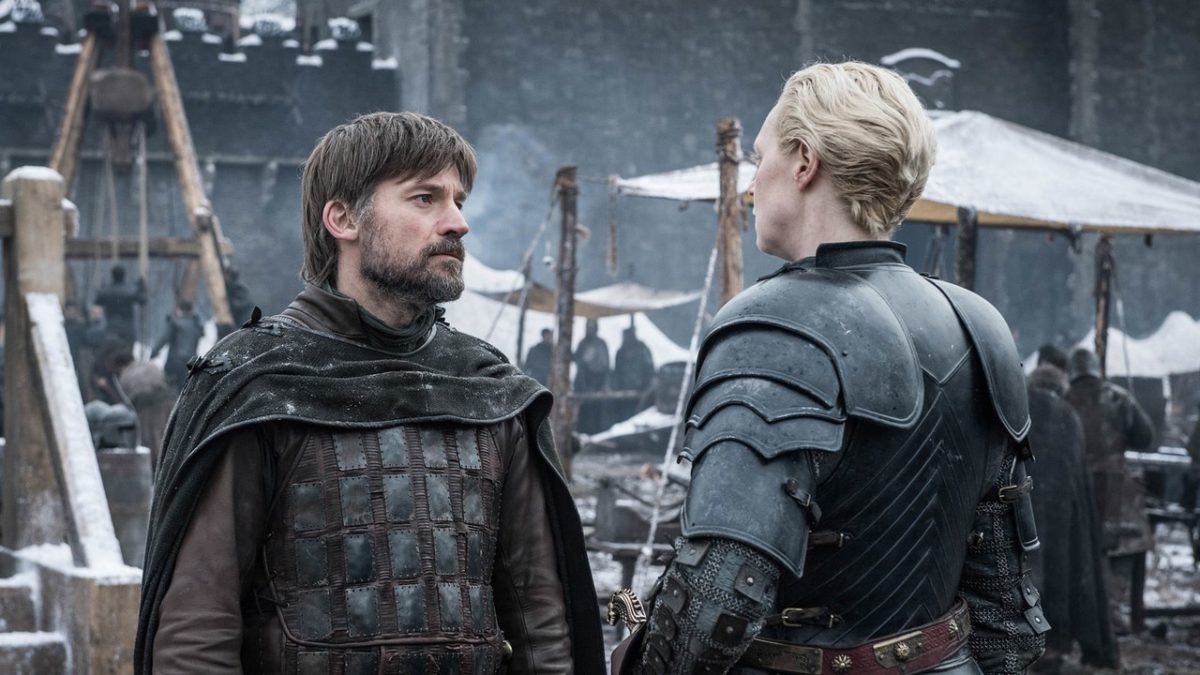Virginity Isn’t Something That Brienne of Tarth Needed Fixed, Game of Thrones

There was a moment in “The Last of the Starks,” Game of Thrones‘ fourth episode of season eight, that stuck out to me because it made an unnecessary addition to Brienne of Tarth’s character that I didn’t particularly enjoy.
We know how Brienne came to serve Renly Baratheon out of love; she knew she could never marry him and wanted to be as close to him as possible, serving as his bodyguard to do so. From this set-up, many have assumed that Brienne was a virgin, a fact that was brought up in “The Last of the Starks.” It was something that I would have been fine with, had Jaime not then left to go back to his sister after sleeping with Brienne.
Here’s my problem with virginity being used as a “defect” of a character: it insinuates that a woman must be fixed by sex (in most media to date, with a man). Brienne, an incredibly powerful woman, was somehow “lacking” as a virgin, with a deficit that only someone else could give her. On top of that, virginity was used as an emotional rationale, in this case, for Brienne begging Jaime to stay. A good writer could have done this without forcing a storyline that made Brienne of Tarth seem “less than” just because she never had sex before and is assumed to be made vulnerable because of it.
The show addresses Brienne’s virginity by bringing it up in a game of Westeros’s version of Never Have I Ever. Tyrion states “You’re a virgin” loudly, knowing that Brienne is the only one at the table who is such and, uncomfortable, Brienne leaves the table to go to the restroom.
From there, Jaime goes later to her room, stating that she has to drink because those are the rules, and thus sleeps with her as both the emotional climax of their relationship but also, seemingly, as a “gift” to Brienne. The storyline comes hot on the tails of Arya asking to have sex with Gendry to know what it is like before going into battle. Which just further drives home, for me, that the show makes virginity feel as if it is something that has to be “fixed” for a person to be considered a fully rounded character. Yes, Arya’s storyline is much better than Brienne’s because it is something she’s choosing with her own agency but still, the sentiment remains. What is the value of a virgin woman?
I’m not the only one who is angry about it, either. Some have gone to Twitter to share their problems with the storyline.
I mean if you’re going to be mad be mad at how the writers left brienne back at winterfell crying over jaime because that my friends is some narrative bullshit
— John DeVore (@JohnDeVore) May 13, 2019
me believing that jaime actually left to kill cersei and didn’t want to hurt brienne:#gameofthrones pic.twitter.com/bE935kRZJW
— kiera (@kieraisnothere) May 13, 2019
And it isn’t like I expect these showrunners to give Brienne of Tarth some big moment in the upcoming series finale. She went from a strong woman who attained her lifelong dream to a woman crying because she gave her virginity to a man who went back into the arms of his sister. Look, maybe I wouldn’t be so mad if he went there to kill Cersei, but instead, Jaime just went to find Cersei, and it almost seemed like a romantic and poetic end to their characters. This left Brienne of Tarth as a woman who “gave” herself to Jaime just to be pushed aside.
It goes back to the same kind thing that happened in Buffy the Vampire Slayer, and a trope that we see all too often. The Buffy incident is one that stuck with many viewers. Buffy was with Angel at the time, giving him her virginity and, in doing so, made Angel the happiest he’s ever been, which, per the weird contract of his soul, meant that his soul left his body and he returned to being an asshole vampire. This left Buffy with a nightmare that many women and men are afraid of, that they’ll share this part of themselves only to realize the partner was unworthy, and have what seemed like an important moment sour into rejection or abandonment.
On television especially, we’ve seen this happen again and again: a big deal is made out of a character’s virginity—usually a woman—and after a lot of build up to having sex, her partner leaves her or scorns her thereafter. Whether it be instantly or after a sex-cation like Jaime had with Brienne, the implications of this reoccurring trope are not great. It also rather establishes a “damned if you do, damned if you don’t” message around sex and virginity. Virginity is viewed as a defect of character to be corrected, but sex, especially fulfilling and emotionally resonant sex, is too often followed by punishment.
Women do not need sex to make us fully-fleshed people and we don’t need a trumpeted losing of virginity (and subsequent betrayal) to give us emotional depth. Brienne of Tarth was so much more than her sexuality, and the relationship she built with Jaime Lannister should have been enough to have her ask him to stay, knowing he’d be walking into his death, without the outdated sexual dynamics first.
(image: HBO)
Want more stories like this? Become a subscriber and support the site!
—The Mary Sue has a strict comment policy that forbids, but is not limited to, personal insults toward anyone, hate speech, and trolling.—
Have a tip we should know? tips@themarysue.com